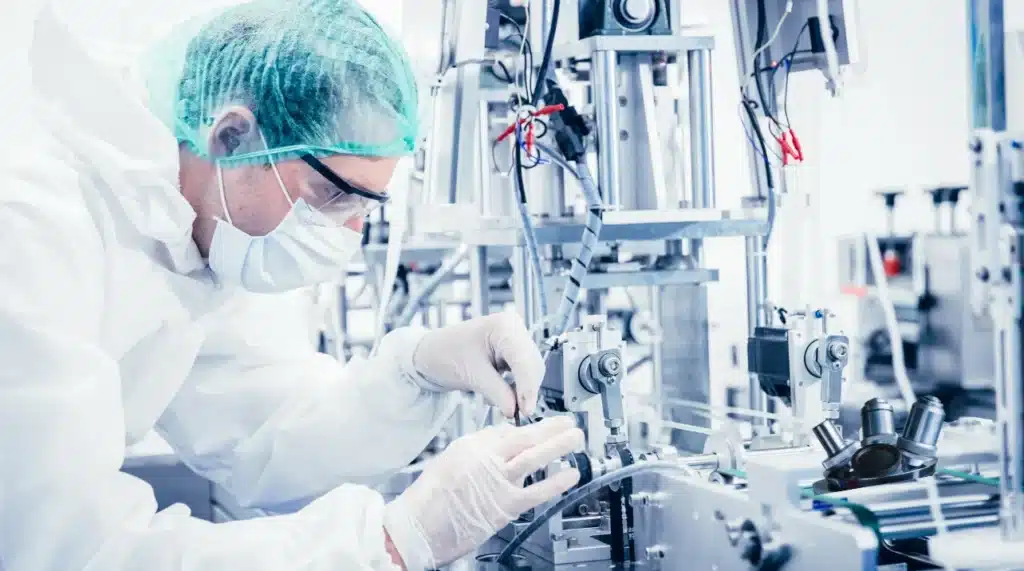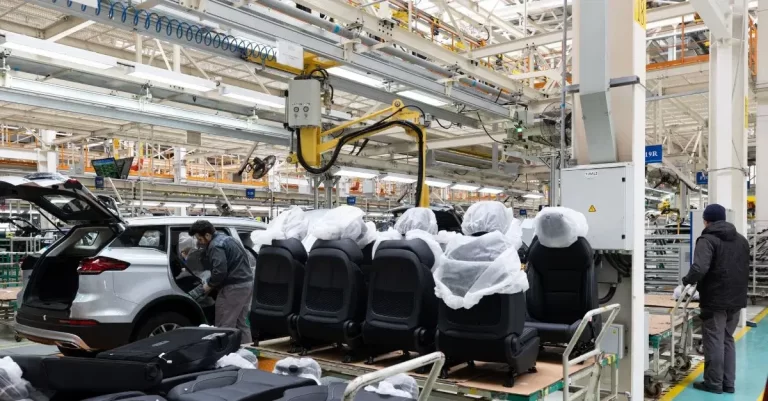Medical device manufacturing needs precision, high quality, and strict regulations. In this field, artificial intelligence (AI) has become a vital tool.
AI in medical device manufacturing makes production more efficient, improves quality, and helps personalize devices. Because of these benefits, AI in medical device manufacturing is becoming a must-have for companies that want accuracy and reliability.
Key Takeaways
- Real-Time Defect Detection in Manufacturing: AI finds quality issues as they happen during production. This helps keep defective products from moving forward along the assembly line. The result is fewer errors and better quality in the final medical devices.
- Human-AI Collaboration in Production: Industry 5.0 combines human skills with AI technology on the factory floor. This teamwork makes production lines more adaptable. It also leads to higher efficiency, which means better quality medical devices.
- Bone Positioning Optimization: AI helps align bone positioning accurately during surgeries. This precision improves outcomes and lowers surgical risks. It also makes it easier for manufacturers to develop specialized orthopedic tools.
- Fluid Cassette Leak Prevention for Device Safety: AI quickly finds leaks in fluid systems used in medical devices. This rapid detection ensures that products are reliable. It also helps maintain patient safety during the use of these devices.
- Regulatory Compliance Tracking in Manufacturing: AI assists manufacturers in meeting strict regulatory requirements. It keeps track of complex rules during production. This makes it easier to meet legal standards while reducing errors.
- Customized Implants from Manufacturing to Patient: AI helps manufacturers create implants that are customized for individual patients. This means that the devices produced are more effective. They are also better suited for each person’s unique needs.
Benefits of AI in Medical Device Manufacturing
AI in medical device manufacturing offers many advantages in production. It helps with quality control, lowers costs, and speeds up production. These improvements come from AI’s ability to analyze data quickly.
It also does it more accurately than people can. Automated processes also make production smoother. AI systems detect defects early. This means there is less waste, and costs are kept lower.
Enhanced Quality Control
Quality control is crucial in medical device manufacturing. Every device needs to meet strict standards for safety and performance. AI-driven systems help reach these standards by finding even the smallest flaws. Machine vision is a common AI tool. It inspects each component in detail. This makes sure only the best devices reach the market. AI systems can also look at data from sensors. This data helps monitor digital health.
AI in medical device manufacturing has also been instrumental in optimizing rigid bone positioning during surgeries. This process uses real-time imaging and AI algorithms to achieve accurate alignment of bones. Such precision improves surgical outcomes and reduces the risk of complications. In addition, AI-based systems are effective in fluid cassette leak detection.
They can identify leaks in real-time, ensuring the reliability of medical devices that rely on fluid systems. These features enhance both safety and efficiency in medical device production.

Reducing Production Errors
Errors in medical device manufacturing can lead to serious consequences. These include product recalls or even harming patients. AI in medical device manufacturing helps reduce these risks through better quality control. It monitors production in real-time to make sure standards are met. Machine learning analyzes data at every stage of production. This helps find irregularities right away.
Unlike predictive maintenance, which prevents equipment from breaking down, this AI use focuses on finding quality issues in parts and processes. When AI detects a problem, it sends an alert immediately. This allows operators to fix the issue early. It stops faulty products from moving further down the line.
Accelerating Production Speeds
AI in medical device manufacturing helps boost production. Automated processes run without stopping. This allows for consistent production. Machine learning algorithms adapt and improve tasks. They help reduce delays on the production line. As a result, manufacturers can meet growing demand without losing quality.
AI also helps make production more efficient. It does this by precisely managing the inventory. Predictive analytics helps make sure resources are used well. This cuts down on downtime and reduces wasted materials.

Regulatory Compliance
Medical device companies must follow strict regulations. A study showed how AI can help. AI helps track and document each step of the manufacturing process. Automated documentation ensures companies meet all guidelines. Using AI reduces the chances of missing important compliance steps.
This helps avoid legal issues and builds trust with healthcare providers and patients. AI does this by keeping detailed records. It automates paperwork. It ensures that standards from the FDA and European Commission are met.
EasyODM’s Medical Device Quality Inspection
EasyODM’s advanced machine vision software has significantly improved quality control in medical device manufacturing. In one of our case studies, our software was used to ensure that directional labels and tube colors were correctly applied during the final assembly stage.
The system catches errors right away, sending real-time alerts so corrections can be made immediately. As a result, faulty products are stopped before they reach patients, leading to safer devices, as well as reduced costs, and improved overall efficiency.

Applications of AI in Medical Device Manufacturing
AI in medical device manufacturing is used in many different ways:
Predictive Maintenance
AI in medical device manufacturing predicts when equipment might fail. It does this by analyzing data from machines to spot signs of wear. Predicting maintenance helps cut down on production downtime. It also helps machines last longer. This way, production keeps running without interruption. This saves both time and money.
Automated Testing
AI is also used for testing medical devices before they reach the market. AI systems simulate real-world conditions to find weaknesses or potential problems. This lets manufacturers fix issues before devices are delivered. As a result, devices are safer and more reliable.
Supply Chain Optimization
AI optimizes the supply chain by analyzing demand patterns and inventory needs. It helps manufacturers get materials on time. AI also predicts changes in demand. This reduces the risk of shortages or overproduction. Better supply chain management lowers costs and keeps production on schedule.
Patient-Centric Impacts in Manufacturing
AI in medical device manufacturing also has a big impact on patients. It helps make advanced, personalized medical devices. AI makes it possible for manufacturers to create devices that fit each patient’s needs.
These include custom implants or wearable monitors for specific health conditions. AI uses real-time data to make these devices more precise. This leads to more precise diagnoses and treatments.
Personalized devices also reduce risks. They are tailored to fit the patient’s needs. They are more effective and less likely to cause problems. AI-powered devices, like wearable heart monitors, help provide ongoing care and monitoring.
As AI becomes more common in manufacturing, devices will become even more patient-focused. This will improve health outcomes and patient satisfaction.
Industry 5.0 and Edge Computing
Industry 5.0 brings together human creativity and advanced AI technologies. It focuses on human-centered approaches. This makes devices better suited for individual patient needs. Industry 5.0 also encourages better teamwork between AI systems and human workers. This improved collaboration leads to smarter and more adaptable production.
Edge computing is also changing AI in medical device manufacturing. It brings AI processing closer to where the data is created. This can be on the factory floor or even inside the devices themselves. It makes processing faster by reducing delays. For medical devices, edge computing allows quicker data analysis. This speed is crucial for real-time diagnostics and quality checks.


Challenges of AI Adoption in Medical Device Manufacturing
Despite its benefits, adopting AI in medical device manufacturing has some challenges:
Regulatory Frameworks
One big challenge is the slow pace of creating regulations that keep up with technology. Regulators struggle to make clear guidelines for AI while keeping safety a priority. This makes the approval process long and complicated. It also slows down the release of new AI-powered devices.
Infrastructure Needs
AI needs a strong infrastructure. This includes fast internet connections. This can be tough in areas without reliable networks. Solutions like dark fiber—unused fiber optic lines—can help. But these solutions are costly. This high cost limits the use of such technology.
Data Privacy
Data privacy is another major concern. AI needs a lot of patient data to work well. This raises issues about confidentiality. Strict security measures are needed to protect this data. This makes it harder to use AI. Finding a balance between protecting privacy and developing AI is challenging.
Overcoming AI Integration Challenges
To overcome these challenges, careful planning is key. Companies should start with small-scale AI projects. This will help ease integration and lower risks. Slowly expanding AI use helps employees get used to the technology. Training is also important to keep staff up to date on AI tools.
Cybersecurity is crucial to protect sensitive production data. Companies need to follow strict regulations. This will ensure data quality. It will also help integrate AI safely into manufacturing.
The Future of AI in Medical Device Manufacturing
AI in medical device manufacturing will keep growing. New technologies like deep learning will help create more custom and efficient devices. As AI evolves, it will keep transforming the industry. More companies will adopt AI to produce innovative, patient-specific products.
In the future, AI in medical device manufacturing will play a huge role in creating devices made for individual patients. It will use large amounts of data to tailor devices to specific needs. AI will also improve medical device design optimization. It helps create designs that are more accurate. They are also more efficient and patient-friendly. This will lead to better surgical outcomes and improve overall patient health.
Conclusion
AI in medical device manufacturing improves quality and speeds up production. It also helps meet strict regulations. These benefits are transforming the industry. AI allows companies to make better, more personalized devices.
There are still challenges, like regulations and privacy concerns. But the benefits are clear. Companies that embrace AI will lead the way. They will produce safe and effective medical devices that meet patient needs.


